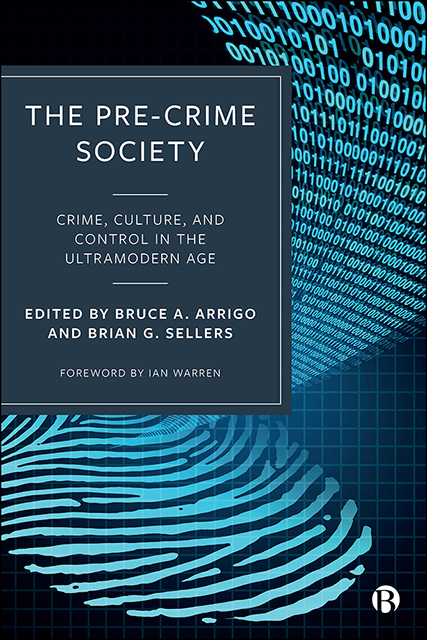Book contents
- Frontmatter
- Dedication
- Contents
- Notes on Contributors
- Foreword
- Introduction: The Ultramodern Age of Criminology, Control Societies and ‘Dividual’ Justice Policy
- Part I Theories, Theorists and Theoretical Perspectives
- Part II Institutions, Organizations and the Surveillance Industrial Complex
- Part III Dataveillance, Governance and Policing Control Societies
- Part IV Systems of Surveillance, Discipline and the New Penology
- Part V Globalizing Surveillance, Human Rights and (In)Security
- Afterword: ‘Pre-Crime’ Technologies and the Myth of Race Neutrality
- Index
Foreword
Published online by Cambridge University Press: 14 April 2023
- Frontmatter
- Dedication
- Contents
- Notes on Contributors
- Foreword
- Introduction: The Ultramodern Age of Criminology, Control Societies and ‘Dividual’ Justice Policy
- Part I Theories, Theorists and Theoretical Perspectives
- Part II Institutions, Organizations and the Surveillance Industrial Complex
- Part III Dataveillance, Governance and Policing Control Societies
- Part IV Systems of Surveillance, Discipline and the New Penology
- Part V Globalizing Surveillance, Human Rights and (In)Security
- Afterword: ‘Pre-Crime’ Technologies and the Myth of Race Neutrality
- Index
Summary
The pre-crime society is expanding. It relies on a growing range of routine and highly specialist surveillance technologies (see McCulloch & Wilson, 2016) to represent a core characteristic of our ultramodern era (Arrigo, Sellers & Sostakas, 2020). This volume is both a significant and sobering resource on the implications of these developments in a control society (Deleuze, 1992) constituted by an increasingly expanding web of criminal justice agencies, pre-emptive laws and corrective interventions that are enacted through ubiquitous and readily accessible data about people.
Underpinning these developments is an equally intricate process of scientific reasoning that has informed various modes of disciplinary and biopolitical governance. Technologies have historically classified information (Hacking, 1991), and people (see McCahill in this volume), to pursue both beneficial and highly problematic social policies. In the ultramodern pre-crime society, these patterns of classification are magnified by the speed and immediacy of data-driven modes of identifying and preventing crime and recidivism. Formal authorities view people not as individuals but through their digitized informational personas (Koopman, 2019, pp. 17–19). As dividuals (Deleuze, 1992, p. 5), subjects are composed through ‘(l)ittle pieces of past patterns’ of behavior or conduct, which are simultaneously used to ‘train’ the algorithms that make the formal decisions about their future (Amoore, 2020, p. 54). As people often voluntarily contribute information that is used to generate more intricate data doubles (Haggerty & Ericson, 2000), there is a greater desire for governments and private companies to exploit this information to demarcate law-abiding people from convicted offenders, and predict who might be criminal at some indeterminate point in the future through increasingly nebulous risk and pre-crime classifications (McCulloch & Wilson, 2016).
Bruce A. Arrigo, Brian G. Sellers and each contributor to this volume are to be commended for providing detailed yet accessible explanations about how these processes are currently evolving. The chapters in this volume offer a range of theoretically informed critiques pointing to the limits of these developments in a range of criminal justice, law enforcement and penal contexts. The Pre-Crime Society: Crime, Culture and Control in the Ultramodern Age covers an extensive scope of issues documented by respected researchers and theorists in the fields of criminology, surveillance studies and penology.
- Type
- Chapter
- Information
- The Pre-Crime SocietyCrime, Culture and Control in the Ultramodern Age, pp. xvii - xxviPublisher: Bristol University PressPrint publication year: 2021



